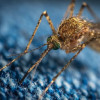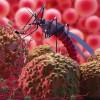
 IJCP Editorial Team
IJCP Editorial Team
Malaria: Prevention and Treatment
Malaria is a potentially deadly infection that is transmitted through the bite of an infected mosquito. If not detected and treated promptly, it can have serious consequences.
Malaria is a severe illness that spreads when a mosquito infected by parasites bites a human and injects them into your bloodstream. Malaria can cause severe health problems such as seizures, brain damage, trouble breathing, organ failure, and death if it isn't treated.
Malaria spreads when the mosquito becomes infected when it bites a person infected with malaria. This mosquito then bites someone else and transfers a parasite to the other person's bloodstream, where these parasites multiply. Five kinds of malaria parasites are known to cause illness in humans.
Prevalence and Risk Factors
Malaria can infect anyone, but young children, older people, and pregnant people are more likely to die from malaria. Some populations are at higher risk of getting seriously ill from malaria, like
• Pregnant women
• Young children
• People over 65 years of age
• Individuals with a weak immune system
• Individuals who had their spleen removed
In rare cases, pregnant mothers with malaria can transfer the disease to their children before or during birth. In rare cases, it is also possible to pass malaria through blood transfusions, organ donations, and hypodermic needles. People who live in poverty and don't have access to healthcare are also at an elevated risk of developing complications from the disease.
Malaria frequently occurs in tropical areas with hot and humid climates. This infection is prevalent in certain parts of the world, like the tropical regions, including-
• large areas of Africa and Asia
• Central and South America
• Dominican Republic and Haiti
• Regions of the Middle East
• Places on Pacific islands
Hence, checking for malaria risk in the country you are traveling to is crucial. If so, take medical advice from a doctor at least 4 to 6 weeks before you travel. They may prescribe you precautionary medications to lower the risk of acquiring malaria and offer tips on thwarting mosquito bites.
Sign and Symptoms of Malaria
Depending on the kind of parasite, symptoms can vary in severity. The symptoms usually appear between 7 and 18 days after an infected mosquito has bitten you. However, parasites can sometimes reside in the body for several years without causing symptoms. The signs will start again when the parasites start circulating. The parasites can remain inactive in the liver and may be released years later into your bloodstream. Depending on the variety of parasites, some types of malaria can occur again.
Malaria is suspected when a person shows symptoms such as-
• A high temperature with sweats and chills
• Feeling of confusion
• Tiredness and sleepiness (particularly in children)
• A feeling of sickness, stomach-ache, and diarrhea
• Appetite loss
• Muscle aches
• Yellowness in the skin and eyes
• A sore throat, cough, and difficulty breathing
The most severe form of malaria, called cerebral malaria, may progress to a coma.
Diagnosis and Treatment
The doctor will examine your symptoms and travel history to diagnose the condition. They may request a blood test to identify the malaria parasites. This information will help them determine the proper treatment.
It is crucial to start malaria treatment at the earliest possible. The doctor will prescribe medications to destroy the malaria parasite. Some parasites may be resistant to malaria drugs. Medications can completely cure malaria.
Antimalarial drugs can have certain side effects. It is crucial to notify your doctor about other medicines you're taking since antimalarial medications can interfere with them. Side effects of the antimalarial drug may include:
• Gastrointestinal (GI) problems like nausea and diarrhea.
• Headaches.
• Increased sensitivity to sunlight.
• Insomnia and disturbing dreams.
• Psychological disorders and vision issues.
• Ringing in the ears (tinnitus).
• Seizures.
• Anemia.
Precaution and Prevention of Malaria
Take the following precautions before you travel to a country with a higher risk of malaria-
Take the prescribed antimalarial medicine
• Use insect repellent over the skin
• Sleep under mosquito nets that have been sprayed with insecticide.
• Wear long-sleeved clothing and trousers to cover most of your skin, especially at night.
• Put screens on windows and doors.
A malaria vaccine for children was developed and tested in Ghana, Kenya, and Malawi in a pilot program. The RTS, S/AS01 vaccine is effective against Plasmodium falciparum malaria, which induces severe disease in children. Other agencies are working towards developing a malarial vaccine.
Intense research has shown scientists that individuals with sickle cell trait carry some protection against malaria caused by Plasmodium falciparum. The sickle shape of the red blood cells traps and destroys the parasites. Studies are still investigating how to apply this information in treating and preventing the disease.
Summary
Malaria is a serious illness but can be prevented by taking simple measures. You can lower your risk of infection by safeguarding yourself from mosquito bites and taking preventive medications. If you're traveling to a region where malaria is common, talk to your doctor several weeks before you leave to get the necessary advice and precautionary doses (critical if you're pregnant).
Early and prompt treatment can help recover malarial illness successfully.

IJCP Editorial Team
Comprising seasoned professionals and experts from the medical field, the IJCP editorial team is dedicated to delivering timely and accurate content and thriving to provide attention-grabbing information for the readers. What sets them apart are their diverse expertise, spanning academia, research, and clinical practice, and their dedication to upholding the highest standards of quality and integrity. With a wealth of experience and a commitment to excellence, the IJCP editorial team strives to provide valuable perspectives, the latest trends, and in-depth analyses across various medical domains, all in a way that keeps you interested and engaged.














Please login to comment on this article